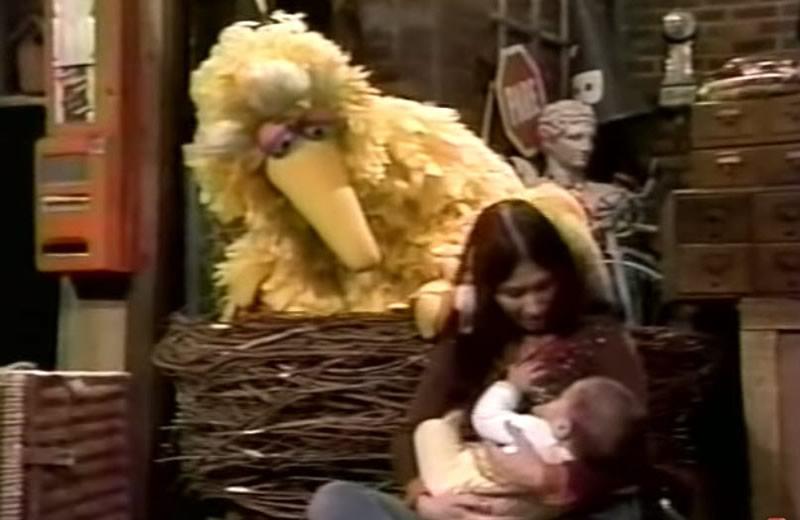In 1977, Buffy Sainte-Marie, a Plains Cree woman from the Piapot reserve, appeared on Sesame Street explaining breastfeeding to Big Bird as she breastfed her son, Dakota "Cody" Starblanket Wolfchild. This was the first time breastfeeding had been shown on a major television station. At the time, this was quite radical. Mothers had been taught since the early 1900s that they should rely on experts for advice and they were recommending formula. In 1977, to push back against “experts” to promote breastfeeding was groundbreaking.
Creating cultural connection through breastfeeding
Since then, we’ve learnt a lot about about the importance of culture in the health and well-being of Indigenous peoples in Canada, and we’re beginning to understand the role breastfeeding plays in connecting to culture. Breastfeeding creates a strong physical bond between mothers and babies that carries the cultural values and beliefs of the mother to the child, connecting the child to the past and future. Research shows that Indigenous moms who have strong cultural and spiritual resources to turn to, take up and keep up breastfeeding, at rates better than the overall population of nursing mothers. For example, Rhodes (2008) found Indigenous women most connected to traditional ways were sixteen times more likely to breastfeed.
The valuable contributions culture can bring to breastfeeding and health has been weakened by colonization. Widespread disruption of home, family and cultural connections has harmed generations of Indigenous people in Canada through Residential Schools, Indian Hospitals, and other high level policies. The widespread disruption caused by colonization meant the loss of mothers, aunties, and grandmothers who were crucial to the success of young mothers’ breastfeeding.
Breastfeeding and child health
Not breastfeeding has a high price. The report on child health released by Northern Health’s Chief Medical Health officer last year, showed rates of early childhood dental caries/cavities (ECC) in Northern BC five times the provincial average, and children living in Northern regions undergo surgery for dental issues at three times the provincial average. The risk for early childhood caries is greater in some Indigenous communites with higher rates of bottle feeding and, in these cases, a cultural approach to breastfeeding is an effective protective factor against ECC.(See: Cidro et al. Breast feeding practices as cultural interventions for early childhood caries in Cree communities, 2015.)
Creating healthy cultural practice
Supporting Indigenous mothers will require extra care from health care providers. Understanding the importance of culture in supporting breastfeeding can reduce the specific and systemic barriers that exist for Indigenous mothers. Many mothers are hungry for the connection between themselves, their children, and their culture. Many loved ones and community members may also want to understand and reclaim their roles in supporting breastfeeding as a cultural practice.
You could be an important bridge for reclaiming these connections.
Questions to ask a breastfeeding mother could include:
- Are there any cultural and traditional practices that would be helpful for you?
- Is there anything special that would help you in breastfeeding?
- Would you like an Elder or trusted loved one to be part of the visit?
Breastfeeding, supported as a healthy cultural practice, promises much for improving and restoring health and well-being within Indigenous communities. Providing culturally safe services is a call to action: What can we do to promote breastfeeding in a culturally safe way for the Indigenous mothers in our care? What is it you can do?
Overall, being aware of the underlying impacts of past negative experiences and how they’ve influenced Indigenous people’s encounters with the health care system is most important. If you can do this, you will send the message that you know about and are ready to respect the cultural bonds of breastfeeding.
We know that discussion of sensitive topics like this may cause distress. Please ensure you or the people you are working with have access to the supports you need.
Want to learn more? Check out:
- Our Tradition, My Choice: One expectant mother's journey about breastfeeding
- Parents call for more Sesame Street breastfeeding segments like 1977 with Buffy Sainte-Marie
Citations:
- Rhodes et al. American Indian Breastfeeding Attitudes and Practices in Minnesota Maternal and Child Health Journal July 2008, Volume 12, Supplement 1, pp 46–54
- Buffy Sainte-Marie started CradleBoard a site to improve curriculum. You can access this interactive web site at http://www.cradleboard.org/2000/mission.html though not all links work.
- Cidrio, et al. feeding practices as cultural interventions for early childhood caries in Cree communities https://www.ncbi.nlm.nih.gov/pmc/articles/PMC4409764/














Comments